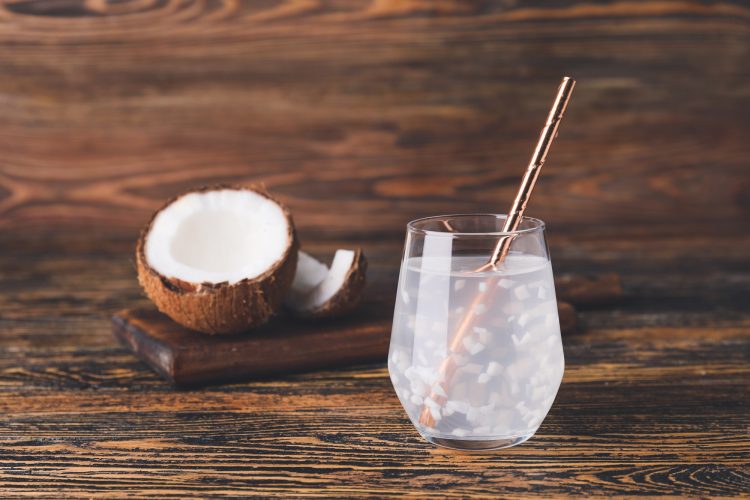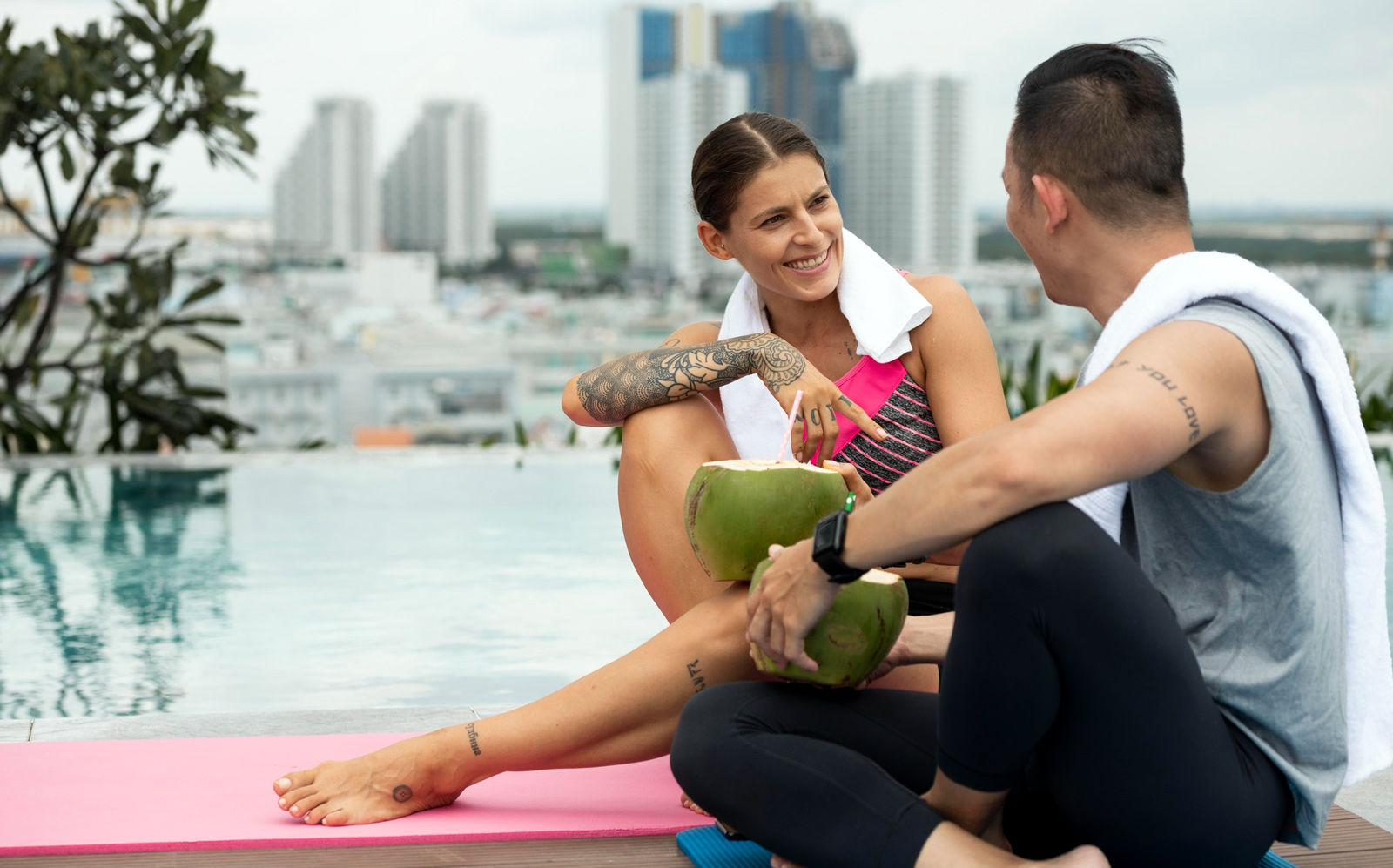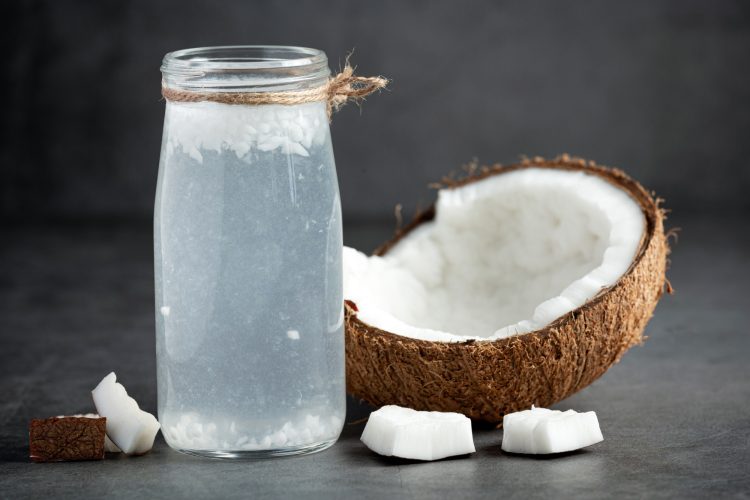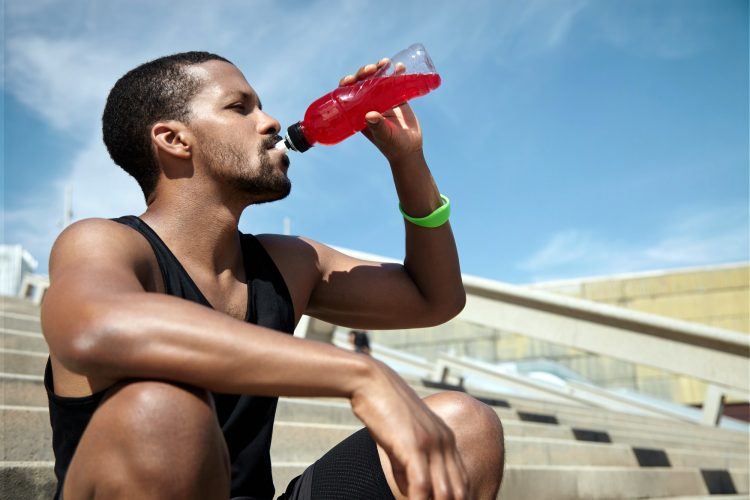As a veteran personal trainer who spends a good chunk of their day in the gym, I see several sweat-soaked people reach for brightly-colored sports drinks that promise instant hydration, an energy surge, and faster recovery.
However, most of these sports drinks are nothing but glorified and overpriced sugar water. A single serving of a sports drink can have as much sugar as a soda. While the added sweetness might give you an energy kick, it comes with an inevitable crash.
The good news is that there are natural ways to replenish after intense workouts that don’t cause sluggishness or hamper the gut microbiome. Enter coconut water!
According to a clinical trial published in the Journal of Physiological Anthropology and Applied Human Science, coconut water is as effective in restoring hydration after exercise as a carbohydrate-electrolyte beverage (sports drink) and plain water. Furthermore, participants experienced less nausea and stomach fullness with coconut water. (1)
In this article, I will take you over everything you need to know about switching from sugar-laden sports drinks to coconut water. We’ll also debunk some of the most common coconut water misconceptions and offer tips on how to get the most out of Mother Nature’s own sports drink.
Coconut Water Ingredients
It contains the following health-boosting compounds:
Electrolytes
Electrolytes are minerals in your blood and other bodily fluids that carry an electric charge, hence the name. These minerals include sodium, potassium, chloride, magnesium, calcium, phosphate, and bicarbonate, and they affect how your body functions in many ways.
Your body loses electrolytes in the form of sweat during a workout. Coconut water contains a handsome amount of potassium, sodium, and magnesium for superior hydration.
Vitamins
Coconut water contains a hefty dose of all essential vitamins, which can support your overall health and well-being. That said, the vitamin content is nowhere close to the Recommended Daily Allowance (RDA). So, don’t give up your multivitamin supplement just yet.
Coconut water contains minimal natural sugars, which can help you stay hydrated during intense training sessions. A big serving of coconut water causes no sugar spikes, which is something that cannot be said about most sports drinks.
Key Electrolytes in Coconut Water
Below are the essential electrolytes in coco-water:
Potassium
It is the most prominent electrolyte in coconut water and is essential for muscle function, nerve health, and regulating your heartbeat.
A study published in the New Zealand Medical Journal concluded that coconut water, due to its high potassium content, could be useful in situations where traditional oral rehydration fluids are unavailable. (2)
“Potassium helps contract muscles, acts as an electrolyte, and supports the body’s fluid balance,” says Monique Richard, a Tennessee-based registered dietitian nutritionist.
If you have been having trouble getting a muscle pump, sipping on coconut water before hitting the gym can make all the difference.
Sodium
Although sodium has got a bad rap in the fitness world for causing water retention and bloating, it is critical for fluid balance. Consuming a healthy amount of sodium daily ensures optimal hydration. Furthermore, it can prevent muscle cramps after an intense workout session.
Magnesium
Magnesium is often overlooked in a healthy diet, but it supports several bodily functions, including energy production. It can also help improve mood, sleep, exercise performance, blood sugar regulation, blood pressure, and cholesterol.
How Coconut Water Supercharges You
Here are the benefits of adding coconut water to your diet:
Better Hydration
For optimal hydration, you must balance electrolytes and water. Coconut water delivers both in a convenient serving, helping you stay energized throughout the day. Remember, if you are only chugging plain water throughout the day, your electrolyte balance is probably not at the optimal levels.
Reduces Muscle Cramps
Muscle cramps can be triggered by various factors, but dehydration and an electrolyte imbalance are the two most common ones. Drinking coconut water daily can help lower the chances of being jolted awake by a painful muscle cramp in the dead of the night.
Energy Booster
You must be properly hydrated with an optimal balance of electrolytes to ensure maximal energy output. Coco-water, with its electrolytes, vitamins, and mild sweet taste, boosts energy production so you can get the most done in your day.
Why You Should Avoid Sports Drinks
Neon-colored sports drinks can be really enticing and can make you feel like they are the real difference maker in the performance of elite athletes and wannabes. However, hardly anyone looks at the nutrition label of these energy drinks. Popular energy drinks are brimming with sugar, and the empty calories don’t boost your performance.
This is how sports drinks could be sabotaging your performance and overall health:
High Sugar Content
It is common for sports drinks to contain over 30 grams of sugar per bottle. Notably, this is nearly the daily recommended sugar allowance of a young individual.
Companies justify it by saying that these added sugars can help fuel an athlete during a high-intensity activity. However, they often conveniently forget to mention the associated energy crashes and side effects of overdosing on sugar.
Instead of chasing sugar highs, focus on eating nutrient-dense whole foods throughout the day. These will help you avoid energy crashes, fatigue, and lack of focus.
Dehydration
Have you ever noticed that you cannot put down a sports drink until it’s completely empty? This is not because the product is delicious but because these products cause mild dehydration, making you sip on the product consistently.
Sports drink companies want you to believe they are hydration solutions. However, the added sugar in the products increases dehydration. They force your body to pull water from different sources to process the sugar content, which nullifies the hydration benefits.
Long-Term Negative Effects
Consistently consuming sports drinks with added sugars for an extended period can increase the risk of health issues like obesity, heart disease, and type 2 diabetes. It can also wreak havoc on your gut health.
Pro Tip: Once your gut microbiome is affected, it can take a long time to rebuild and function optimally.
More Additives
Sugar is not the only cause for concern in an energy drink. Sports drinks contain various artificial sweeteners and colors, which can cause potential health concerns. You must carefully analyze every food and beverage’s nutritional label before adding them to your cart.
Why You Should Choose Coconut Water Over Sports Drinks
Here are the reasons why you should opt for coconut juice over commercial energy drinks:
All Natural
Unlike commercial sports drinks, coconut water wasn’t created in a lab using ingredients that are too hard to pronounce. It is the pure, unfiltered, and unprocessed liquid from a young coconut that can boost your hydration and electrolyte balance.
The Crucial Electrolytes
Electrolytes are necessary for everything from nerve function to muscle contraction. Coconut water contains potassium, magnesium, sodium, calcium, and phosphorus, which are key electrolytes that ensure optimal body functioning. Most importantly, these electrolytes form naturally in coco juice and are not produced on an assembly line, as is the case with sports drinks.
Sugar-Free Sweetness
If you have ever tasted a coconut, which most of you reading probably have, you would know that coconut water has a distinctive sweetness. It is sweet enough to satisfy your cravings, but it is not so sweet that it gives you a sugar rush, followed by a crash. Most popular sports drinks have as much added sugar as a soda.
Easy on the System
An excessive amount of sports drinks can cause bloating or nausea for some people. This is because most sports drinks are packed with artificial ingredients which are harsh on the digestive system.
Coconut water is inherently light and easily absorbed by your body, leading to better overall hydration.
Debunking Coconut Water Misconceptions

If you research coconut water long and hard enough, you’ll learn some common myths and misconceptions. Let’s address them in this section.
Coconut water doesn’t have enough sodium
This, my friends, is actually true.
A serving of coconut water cannot match the sodium content of a commercial sports drink. That said, most of us don’t need higher amounts of sodium until we’re sweating buckets every day, like most elite athletes.
The sodium and potassium content of coconut juice is fine for most hobbyist exercisers.
Coconut water is the answer to all my hydration problems
While coco-water is a natural and healthy way to rehydrate, it’s not a magic bullet. You must adjust your hydration strategy according to your activity level. Feel free to balance commercial sports drinks and coconut water if you routinely engage in prolonged high-volume workouts.
Gulp down all the coconut water for ultimate health
Remember, too much of anything is bad. Coconut water is a healthy food source that should be a part of your balanced nutrition program. You don’t need to give up plain water in favor of coconut water to see its benefits. Use it to plug the gaps in your diet regime.
How To Use Coconut Water In Your Routine
So, how does coconut water fit into your life? Here are some tips you can apply:
- Everyday Hydration: Switch from sugary sodas and processed juices to natural coconut water. One coconut water daily is a good place to start.
- Post-Workout Replenishment: The electrolytes and natural sugars in coconut water can help you refuel and rehydrate after a workout.
- High-Intensity or Prolonged Exercise: Consider pairing coconut water with a specialized sports drink for additional electrolytes and carbs to provide a consistent energy supply.
Supermarket shelves are stacked with endless packaged coconut water. You must always read the nutritional label before buying packaged coconut water.
“The issue is that because coconut water has become so popular, there can be so much added sugar to many brands,” says Cordelia McFadyen, a board-certified holistic nutritionist in Alberta, Canada.
Whenever you have the choice, opt for natural coconut water. It might cost you a little extra, but it is well worth it.
Conclusion
Let’s be honest: sports drinks are liquid candy for athletes. If you are looking for a way to hydrate naturally, coconut water can provide all the hydration benefits of sports drinks minus the artificial colors, flavors, and boatload of sugar.
Furthermore, the delicious, tropical flavor of coconut water makes staying hydrated a pleasure instead of a chore.
If you have any questions about coconut water, drop them in the comments below, and I’ll be happy to help!
References
- Saat, M., Singh, R., Sirisinghe, R. G., & Nawawi, M. (2002). Rehydration after exercise with fresh young coconut water, carbohydrate-electrolyte beverage and plain water. Journal of physiological anthropology and applied human science, 21(2), 93–104.
- Kuberski, T., Roberts, A., Linehan, B., Bryden, R. N., & Teburae, M. (1979). Coconut water as a rehydration fluid. The New Zealand Medical Journal, 90(641), 98–100.
Tip: If you're signed in to Google, tap Follow.












